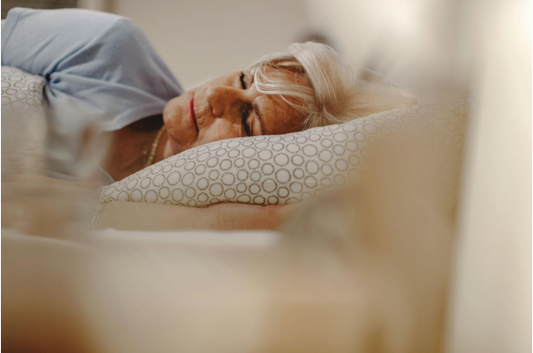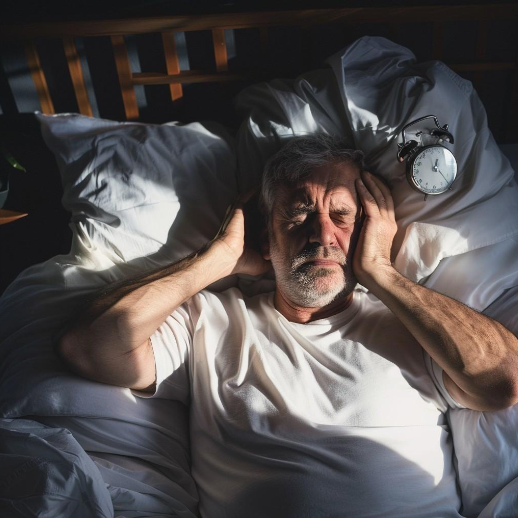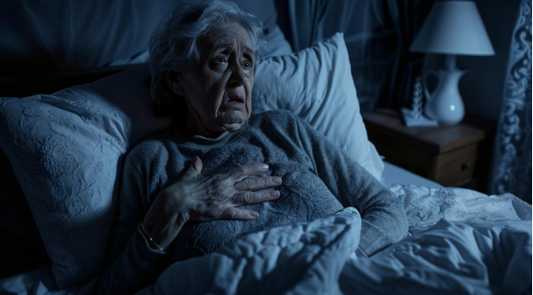Do you find yourself tossing and turning at night, counting sheep until the early hours? You're not alone. Sleep disorders are a common struggle among older adults, affecting millions and impacting overall health and life quality. Many seniors face restless nights due to conditions like insomnia, sleep apnea, and restless leg syndrome. These challenges can lead to daytime fatigue, mood swings, and more serious health concerns if left untreated. But don’t worry, understanding the symptoms and available treatments can make a world of difference. This post will guide you through common sleep issues in older adults and explore how to find the restful nights you deserve.
Overview of Common Sleep Disorders in Older Adults
As we age, getting a good night's sleep might feel like an elusive dream. Sleep is crucial for maintaining mental and physical health, yet many older adults find themselves tossing and turning or waking up exhausted. Understanding the common sleep disorders faced by seniors is the first step towards finding solutions. Let's explore some of these challenges and see how they might affect you or your loved ones.
Insomnia
Insomnia, that frustrating inability to fall or stay asleep, is more than just an annoyance. It's a common issue among older adults, affecting up to 48% of seniors. Symptoms often include:
- Difficulty falling asleep
- Waking up frequently during the night
- Feeling tired upon waking
What causes insomnia in seniors? It can be linked to various factors like stress, depression, or even certain medications. Sometimes, it can seem like a cruel trick that the mind plays, refusing to shut down even when the body is weary.
Statistics show that insomnia is not confined to one group; it's a widespread problem. Around 30% to 48% of older adults report insomnia symptoms, but this doesn't mean it's a natural part of aging. That's a misconception we need to clear. Sleep is vital at any age, and finding the right treatment, whether behavioral or medicinal, can make all the difference.
Sleep Apnea
Are you told that you snore loudly or wake up feeling more tired than when you went to bed? Sleep apnea might be the culprit. There are two main types:
- Obstructive Sleep Apnea (OSA): This occurs when throat muscles relax overly. It leads to loud snoring and moments when breathing stops.
- Central Sleep Apnea: Unlike OSA, this is a communication issue. The brain doesn't send proper signals to muscles that control breathing, leading to abrupt awakenings.
Common symptoms include loud snoring, gasping for air during sleep, and excessive daytime drowsiness. Though it might seem like an exaggerated description, imagine your airways as a garden hose. When obstructed, the flow is disturbed, causing that unmistakable snoring sound.
Restless Legs Syndrome (RLS)
Restless Legs Syndrome is another sleep thief, characterized by unpleasant sensations in the legs that create an overwhelming urge to move them. These sensations could be described as:
-
Itching
- Crawling
- Pulling
- Throbbing
These symptoms usually strike in the evening or at night, making it hard to fall and stay asleep. It's like having a motor in your legs that refuses to let you be still, disrupting both your sleep and your peace.
RLS affects people of all ages, but for seniors, it can become a persistent annoyance. It's not just about having jitters; this syndrome can deeply impact the quality of life, making restful sleep seem out of reach.
Understanding these common sleep disorders is just the beginning. Recognizing the symptoms and knowing when to seek help can pave the way to better, more restful nights. Remember, sleep isn't a luxury; it's a necessity, and prioritizing it can lead to healthier and happier days.
Diagnosis of Sleep Disorders
Diagnosing sleep disorders in older adults is like piecing together a puzzle. Each piece of information helps reveal the bigger picture of what's happening during your slumber. From asking the right questions to conducting detailed studies, understanding sleep disorders requires a comprehensive approach. Let’s break down two essential parts of this process.
Medical History and Sleep Diaries
Your journey towards a diagnosis often starts with a detailed medical history and a sleep diary. Why are these important? Think of them as the starting points of a roadmap to better sleep. Discussing your medical history with your doctor helps them understand what might be causing your sleep problems. They’ll ask questions about:
- Recent Changes: Are there new medications or lifestyle changes?
- Previous Sleep Issues: Have you had sleep troubles in the past?
- Daily Habits: What time do you go to bed and wake up? How much caffeine or alcohol do you consume?
Then comes the sleep diary. This isn’t just a regular journal, but a tool for tracking your sleep patterns over several weeks. You’ll note:
- Bedtime: What time do you go to sleep?
- Wake-up Time: When do you wake up?
- Sleep Interruptions: How often do you wake up at night?
This diary helps highlight trends, like if you're consistently waking up at 2 a.m., that might reveal underlying issues.
Polysomnography
Ever wondered what happens during a sleep study? Polysomnography is the process that digs deeper into your night’s rest. It's like a detective story for your sleep, offering a detailed analysis that simple observations can't reveal.
Here’s what happens during the study:
- Preparation: You're set up in a sleep lab, which might feel like a cozy hotel room, where you’ll spend the night.
- Monitoring: Electrodes will be placed on your body to monitor brain waves, oxygen levels, heart rate, and breathing patterns.
- Recording: The data collected helps identify disturbances like sleep apnea or restless legs syndrome.
Why go through all this? Polysomnography provides a detailed snapshot of what's happening while you snooze. For instance, it can catch if your breathing pauses during the night, a common sign of sleep apnea. This comprehensive data helps clinicians tailor treatment plans specifically for you.
By combining detailed patient history, sleep diaries, and advanced sleep studies like polysomnography, diagnosing sleep disorders becomes a more manageable task. Each piece of information is essential to crafting a clearer picture of your sleep health, leading to more effective treatments and, ultimately, a better night's rest.
Treatment Options for Sleep Disorders
Growing older doesn't mean you have to resign yourself to restless nights. A good night's sleep is crucial for health, mood, and energy. Let's explore some effective treatment options for common sleep disorders among older adults. These options offer various paths to improved sleep, from professional therapies to simple lifestyle tweaks.
Cognitive Behavioral Therapy for Insomnia (CBT-I)
Cognitive Behavioral Therapy for Insomnia, or CBT-I, is a structured program that targets the thoughts and behaviors causing sleep problems. It's like having a personal sleep coach. CBT-I helps you change negative beliefs about sleep into positive ones and teaches relaxation techniques to calm your mind. Research shows that older adults see significant improvements in their sleep with CBT-I. It's effective, safe, and doesn't involve medications. Many people find relief by attending therapy sessions either in person or even over the phone. It's a gentle approach that can make a world of difference for those tossing and turning at night.
Medications
Sometimes, the doctor might suggest medications to help with sleep disorders. These can include:
- Melatonin Agonists like Ramelteon.
- Nonbenzodiazepines such as Z-drugs (e.g., Zolpidem, Eszopiclone, Zaleplon).
- Antidepressants that have sedative properties.
While pills can be effective, they're not without risks. Common side effects can include dizziness, daytime drowsiness, and confusion. It's crucial to use them under a healthcare provider's guidance, especially since older adults are more susceptible to these side effects.
Lifestyle Changes and Sleep Hygiene
You don't always need a prescription to sleep better. Sometimes, improving your "sleep hygiene" can do the trick. Here’s what you can try:
- Stick to a Routine: Go to bed and wake up at the same time every day. This helps regulate your body clock.
- Create a Sleep-friendly Environment: Keep your bedroom dark, cool, and quiet. Consider blackout curtains and noise machines if needed.
- Limit Caffeine and Screens: Avoid caffeine in the afternoon and put away screens at least an hour before bed.
By making these straightforward adjustments, many older adults find they can improve their sleep quality significantly without any medications. It's a practical approach that aligns well with natural circadian rhythms, helping you welcome a restful slumber each night.
Each of these treatment paths offers unique benefits, and for many, a combination might be the key to sweet dreams. Rest easy knowing you have options!
Conclusion
Addressing sleep disorders in older adults is crucial for enhancing their quality of life. Recognizing symptoms early and pursuing accurate diagnosis can pave the way for effective treatment options, improving not only sleep but also overall health.
If you're experiencing sleep difficulties, prioritizing professional help can make a significant difference. Experts can tailor solutions to fit your specific needs, ensuring you get the restful nights you deserve.
Consider discussing your sleep concerns with a healthcare provider. Taking this step could be key to a more energetic and fulfilling life.
Feel free to share your experiences or thoughts in the comments. Your journey might inspire others struggling with similar challenges.
P.S.
If you are having difficulty with sleeping, you are not alone. There are many folks out there who want to know what the most effective natural sleep aid is to get them back to snoozing again. Fix My Sleep is a great resource for all those who have trouble sleeping and are looking for innovative tips and sleep products to help them get a good night’s sleep.





